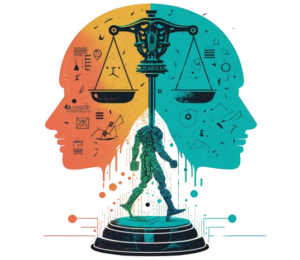ARTIFICIAL INTELLIGENCE IN DIGITAL WORLD
In the ever-evolving digital landscape, the pervasive influence of Artificial Intelligence (AI) cannot be overstated. While it promises transformative advancements across industries, its implementation requires meticulous consideration of ethical, societal, and practical implications. Let’s delve deeper into the multifaceted impact of AI on the digital world, addressing crucial aspects and real-time examples:
Precision and Clarity of User Experience:
AI-driven chatbots and virtual assistants indeed streamline user interactions, yet the quality of these experiences often varies widely. Companies must prioritize refining these systems to offer seamless and genuinely helpful support. Take for instance, the customer service chatbot deployed by Shopify. While effective in handling routine inquiries, its limitations highlight the ongoing need for refinement and human oversight.


Data Analysis and Interpretation:
AI’s prowess in data analysis is undeniable, but the challenge lies in extracting meaningful insights from the deluge of information. Businesses must invest in robust analytics frameworks to ensure accurate interpretations. A pertinent example is Netflix’s recommendation algorithm, which continuously refines user preferences to curate personalized content. However, occasional misfires underscore the inherent complexities of predictive modeling
Efficiency and Automation:
Automation through AI holds the promise of increased efficiency, yet the fear of job displacement looms large. While repetitive tasks can indeed be automated, companies must prioritize reskilling initiatives to empower employees for higher-value roles. Amazon’s utilization of AI-powered robots in its warehouses exemplifies this efficiency drive, albeit accompanied by concerns regarding job security and worker well-being.


Content Creation and Bias Mitigation:
AI-generated content presents exciting possibilities, but inherent biases and quality inconsistencies demand careful curation and oversight. OpenAI’s GPT-3 showcases the potential for AI-generated text, yet it also underscores the importance of ethical AI development and vigilant bias mitigation efforts.
Ethical AI Development and Governance:
As AI permeates society, robust ethical frameworks and governance mechanisms are imperative to mitigate unintended consequences and ensure equitable outcomes. Initiatives like the Partnership on AI strive to foster collaboration and dialogue among stakeholders to address ethical challenges and promote responsible AI development.


Infrastructure and Urban Development:
Smart city initiatives leveraging AI-driven technologies hold promise for enhancing urban living, yet they also raise concerns regarding surveillance and data governance. Alphabet’s subsidiary, Sidewalk Labs, faced backlash over its proposed smart city project in Toronto due to concerns surrounding data privacy and public accountability.
CONCLUSION:
In navigating the complexities of AI in the digital realm, it is crucial to approach its deployment with a critical lens, mindful of its potential pitfalls and ethical considerations. By fostering dialogue, transparency, and responsible innovation, we can harness the transformative power of AI to shape a more inclusive, equitable, and sustainable digital future.
